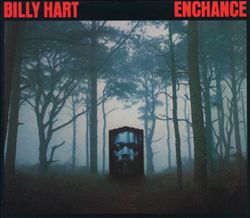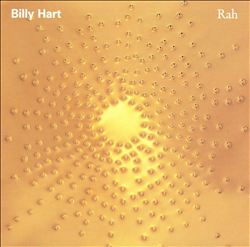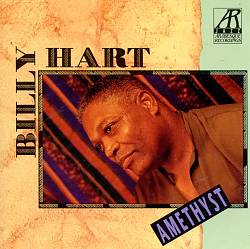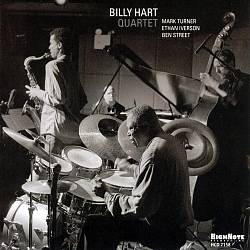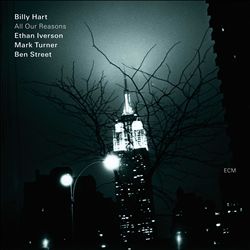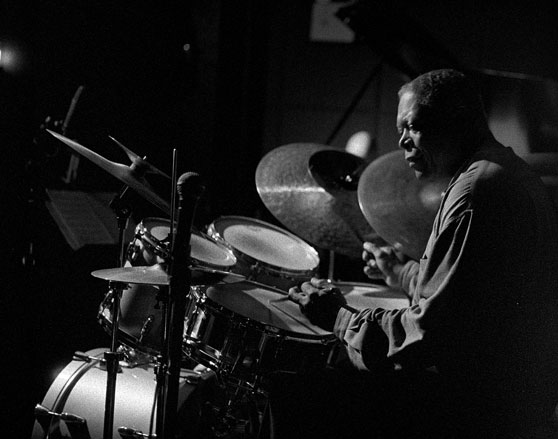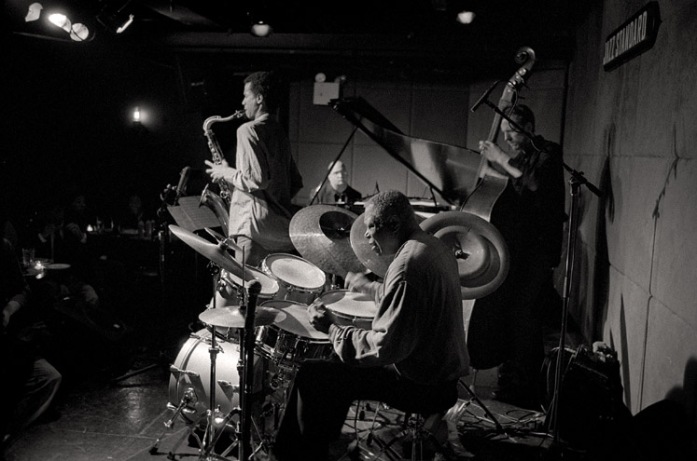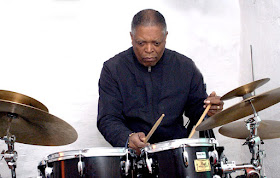SOUND PROJECTIONS
AN ONLINE QUARTERLY MUSIC MAGAZINE
EDITOR: KOFI NATAMBU
SUMMER, 2020
VOLUME NINE NUMBER ONE
BRIAN BLADE
Featuring the Musics and Aesthetic Visions of:
SULLIVAN FORTNER
(August 8-14)
JOEL ROSS
(August 15-21)
HORACE TAPSCOTT
(August 22-28)
BILLY HART
(August 29-September 4)
MARC CARY
(September 5-11)
EDDIE HENDERSON
(September 12-18)
CECIL MCBEE
(September 19-25)
MAKAYA MCCRAVEN
(September 26-October 2)
FRANK MORGAN
(October 3-9)
RASHIED ALI
(October 10-16)
DON REDMAN
(October 17-23)
IDRIS MUHAMMAD
(October 24-30)
Billy Hart
(b. November 29, 1940)
Artist Biography by Matt Collar
An esteemed drummer and educator, Billy Hart is one the foremost jazz performers of his generation, capable of balancing propulsive swing with a nuanced sense for group dynamics and improvisational flow. Following his early years backing Shirley Horn and Jimmy Smith in the 1960s, Hart emerged at the forefront of the '70s fusion movement, playing with Herbie Hancock's Mwandishi band, as well as Miles Davis, McCoy Tyner, and others. Though Hart led few of his own sessions during the first two decades of his career, albums like 1977's Enchance and 1985's Oshumare found him balancing experimental elements with acoustic post-bop traditions. Along with performing, he has built a strong reputation as a mentor and teacher, having held positions at New England Conservatory and Western Michigan University. Nonetheless, he continues to tour and record, often leading his quartet as on 2014's One Is the Other and 2017's Find the Way. Born William "Billy" Hart in 1940 in Washington, D.C., Hart grew up in a creative, intellectually minded family with a father who worked as a mathematician. The family lived close to the local Spotlite Club, where he became aware of artists like Miles Davis, Lee Morgan, and Art Blakey. Both his parents were also huge music fans and introduced him to jazz including Duke Ellington and Jimmie Lunceford. Hart was also encouraged to play music by his paternal grandmother, a concert pianist who had the opportunity to accompany Marian Anderson. Similarly, his maternal grandmother knew tenor saxophonist Buck Hill and encouraged Hart's interest in bebop, buying him his first drum set. It was Hill who first hired a then 17-year-old Hart to play an extended gig with the Abart's club house band that also featured his classmates pianist Reuben Brown and bassist Butch Warren.
After high school Hart continued to play, balancing his jazz gigs with his mechanical engineering studies at Howard University; however, he left school early to tour with vocalist Shirley Horn. It was with Horn that Hart has said he developed most as a performer, gaining better sense of dynamics. It was also during this period in the early '60s that he took jobs playing at Charlie Byrd's Showboat Lounge backing rising Brazilian stars including Antônio Carlos Jobim, João Gilberto, and Bola Sete. Hart made his recorded debut in the '60s playing with Hammond B-3 master Jimmy Smith's group. There were also notable sessions with Stan Getz, Eddie Harris, Herbie Hancock, and Pharoah Sanders, among others.
By the late '60s, Hart's former Howard classmate saxophonist Marion Brown had introduced him to the music of drummers Sunny Murray and Rashied Ali. Their propulsive styles spurred his growing interest in experimental and avant-garde jazz. He further expanded his creative mindset in the 1970s working with Joe Zawinul, Wayne Shorter, and McCoy Tyner, the latter of which he spent two years playing with. He also continued his association with Hancock, appearing on such landmark funk and fusion albums as Sextant, Mwandishi, and Treasure Chest. His connection to Hancock also found him playing on Miles Davis' On the Corner and Big Fun. There were other fusion outings including appearing with fellow Hancock bandmate Eddie Henderson on 1973's Realization, 1975's Sunburst, and 1976's Heritage. He also joined his other Hancock alum Bennie Maupin for 1977's The Jewel in the Lotus, worked regularly with Stan Getz, and appeared on sessions with Pat Martino, Joanne Brackeen, and Hal Galper.
Hart was in his mid-thirties by the time he made his debut as leader with the expansive 1977 album Enchance on the A&M label. Joining him was a bevy of forward-thinking artists in Oliver Lake, Don Pullen, Dewey Redman, Marvin "Hannibal" Peterson, and Dave Holland. He then returned to his work with others throughout the late '70s and early '80s, appearing on albums with Pepper Adams, John McNeil, Don Friedman, Buster Williams, Duke Jordan, John Scofield, Terumasa Hino, and others. In 1985, he issued is own Oshumare on Gramavision, a far-reaching post-bop session that featured contributions by bassist Holland, violinist Didier Lockwood, guitarists Bill Frisell and Kevin Eubanks, as well as saxophonists Branford Marsalis and Steve Coleman, and percussionist Manolo Badrena. Hart put together a similarly impressive lineup for 1987's Rah, which found him reuniting with Mwandishi trumpeter Eddie Henderson, and working with saxophonist David Liebman, pianist Kenny Kirkland, guitarist Frisell, and others.
Along with his continued performance work, Hart (who lives in Montclair, New Jersey) moved into education in the '90s, teaching at the Oberlin Conservatory of Music, and joining the adjunct faculty at the New England Conservatory of Music and Western Michigan University. He also began giving private lessons through The New School and New York University, and made appearances at various clinics and jazz camps. More adventurous albums followed including 1993's Amethyst, and 1997's Oceans of Time. He also worked with Charles Lloyd, Tom Harrell, Joe Lovano, Niels-Henning Ørsted Pedersen, and more.
In 2006, he issued Quartet, his debut with his group featuring saxophonist Mark Turner, pianist Ethan Iverson, and bassist Ben Street. A trio date, Route F, also arrived that same year, followed in 2009 by the Belgian concert album Live at the Cafe Damberd. Hart marked his 68th birthday in 2011 with the hard-driving acoustic post-bop session Sixty-Eight, featuring pianist Dan Tepfer, trumpeter Jason Palmer, alto saxophonist Logan Richardson, vibraphonist Michael Pinto, and bassist Chris Tordini. He also joined trumpeter Eddie Henderson, saxophonist Billy Harper, and other veteran players in the Cookers.
Two more quartet albums followed on ECM with 2012's All Our Reasons and 2014's One Is the Other. Also in 2014, he joined vibraphonist Bobby Hutcherson, saxophonist David Sanborn, and organist Joey DeFrancesco for Enjoy the View, which earned a Grammy nomination for Best Jazz Instrumental Album. A year later, Hart again paired with trumpeter Eddie Henderson for Infinite Spirit: Revisiting Music of the Mwandishi Band. The drummer was then featured with the German WDR Big Band for 2016's The Broader Picture, and he joined pianist Aaron Parks for 2017's Find the Way on ECM. In 2019, Hart collaborated with drummer and former student Eric Thielemans on Talking About the Weather.
https://musicians.allaboutjazz.com/billyhart
 Billy Hart
Billy Hart
His first steady gigs of note were with Shirley Horn and Buck Hill.
In the 1960’s he toured with Jimmy Smith, Wes Montgomery, Eddie Harris,
and Pharoah Sanders. In 1970 he joined Herbie Hancock’s Sextet, and
after that band broke up in 1973 he joined first McCoy Tyner (two years)
and then Stan Getz (four). In the 1980’s Hart was a regular with many
bands and leaders: Gerry Mulligan, Billy Harper, Clark Terry, The New
York Jazz Quartet, the Jazztet, Mingus Dynasty and most extensively with
Quest (with David Liebman, Ritchie Beirach, and Ron McClure). In the
1990’s Hart was a member of the Charles Lloyd, Joe Lovano, and Tom
Harrell groups, and in 1999 he began performing with the Three Tenors
(Liebman, Lovano, and Michael Brecker). He is on about 500 hundred
records as a sideman.
Billy Hart's own records include:
Enchance (1977, A&M Horizon) with Dewey Redman, Marvin “Hannibal” Peterson, Eddie Henderson, Oliver Lake, Don Pullen, Buster Williams, and Dave Holland
Such Great Friends (1983, Strata East) with Billy Harper, Stanley Cowell, and Reggie Workman.
Oshumare (1985, Gramavision) with Steve Coleman, Branford Marsalis, Didier Lockwood, Kenny Kirkland, Bill Frisell, Kevin Eubanks, Mark Grey, and Dave Holland
Great Friends (1986, Evidence) with Sonny Fortune, Billy Harper, Stanley Cowell, and Reggie Workman
Billy Hart's own records include:
Enchance (1977, A&M Horizon) with Dewey Redman, Marvin “Hannibal” Peterson, Eddie Henderson, Oliver Lake, Don Pullen, Buster Williams, and Dave Holland
Such Great Friends (1983, Strata East) with Billy Harper, Stanley Cowell, and Reggie Workman.
Oshumare (1985, Gramavision) with Steve Coleman, Branford Marsalis, Didier Lockwood, Kenny Kirkland, Bill Frisell, Kevin Eubanks, Mark Grey, and Dave Holland
Great Friends (1986, Evidence) with Sonny Fortune, Billy Harper, Stanley Cowell, and Reggie Workman
Rah (1987, Gramavision) with Dave Liebman, Kenny
Kirkland, Eddie Henderson, Ralph Moore, Kevin Eubanks, Bill Frisell,
Mark Grey, Eddie Gomez, Buster Williams, and Caris Visentin
Amethyst (1993, Arabesque) with John Stubblefield, Mark Feldman, David Fiuczynski, David Kikoski, Marc Copland, and Santi Debriano
Oceans of Time (1996, Arabesque) with John Stubblefield, Chris Potter, Mark Feldman, David Fiuczynski, David Kikoski, and Santi Debriano
Since the early 1990’s Billy Hart has devoted a lot of time to teaching.
He spends considerable time at the Oberlin Conservatory of Music, but he is also adjunct faculty at the New England Conservatory of Music and Western Michigan University.
He also teaches private lessons through The New School and New York University, and often contributes to the Stokes Forest Music Camp and the Dworp Summer Jazz Clinic in Belgium.
Billy Hart plays Pearl Drums and Zildjian cymbals.
http://www.cruiseshipdrummer.com/2020/03/billy-hart-interview.html
More Billy Hart. Michael Griener sent me this 1994 Modern Drummer interview by Ken Micallef, and it's excellent. It gives a much fuller picture of his musical intellect than I got to see in the clinic. This is high level player's philosophy.
Micallef says at the beginning, “Categorizing Hart's contribution is no easy task. Among the four hundred or so albums Hart has recorded— including his solo records— one hears a musician not so much in love with the drums as with the possibilities they hold for expression within the music.” I think that may be part of why I have been slow to get into his playing seriously— he doesn't project an overt drumming personality the same way as some other players. No one would ever dismiss him as being a stylist.
I'm going to excerpt the interview pretty heavily, because that's what this site is about: collecting important information about drumming. So thank you Ken and thank you Modern Drummer, without you this important contribution to the literature of drumming would not exist. Subscribe to MD and call up Ken and tell him thank you.
Also see Ethan Iverson's interview with Hart
With Charles Earland
With Duke Jordan
With Horace Tapscott
Amethyst (1993, Arabesque) with John Stubblefield, Mark Feldman, David Fiuczynski, David Kikoski, Marc Copland, and Santi Debriano
Oceans of Time (1996, Arabesque) with John Stubblefield, Chris Potter, Mark Feldman, David Fiuczynski, David Kikoski, and Santi Debriano
Since the early 1990’s Billy Hart has devoted a lot of time to teaching.
He spends considerable time at the Oberlin Conservatory of Music, but he is also adjunct faculty at the New England Conservatory of Music and Western Michigan University.
He also teaches private lessons through The New School and New York University, and often contributes to the Stokes Forest Music Camp and the Dworp Summer Jazz Clinic in Belgium.
Billy Hart plays Pearl Drums and Zildjian cymbals.
http://www.cruiseshipdrummer.com/2020/03/billy-hart-interview.html
Monday, March 2, 2020
Billy Hart interview
 |
| Photo by Anthony Porcar Cano |
More Billy Hart. Michael Griener sent me this 1994 Modern Drummer interview by Ken Micallef, and it's excellent. It gives a much fuller picture of his musical intellect than I got to see in the clinic. This is high level player's philosophy.
Micallef says at the beginning, “Categorizing Hart's contribution is no easy task. Among the four hundred or so albums Hart has recorded— including his solo records— one hears a musician not so much in love with the drums as with the possibilities they hold for expression within the music.” I think that may be part of why I have been slow to get into his playing seriously— he doesn't project an overt drumming personality the same way as some other players. No one would ever dismiss him as being a stylist.
I'm going to excerpt the interview pretty heavily, because that's what this site is about: collecting important information about drumming. So thank you Ken and thank you Modern Drummer, without you this important contribution to the literature of drumming would not exist. Subscribe to MD and call up Ken and tell him thank you.
Anybody can be a great instrumentalist. It's simply a matter of technique. The difference is in musicianship. You can be a great instrumentalist, but there are very few musicians.
Coltrane once told me about Elvin, “No matter how tense the situation gets, Elvin never tightens up.” I learned what that means. You don't mind taking chances in certain situations because you have confidence that it will come out. Or you enjoy reaching for it even if it doesn't come out.
[Milford Graves and Sunny Murray] were like magic; they conjured up spirits and ghosts and rainbow. You could actually believe that these guys could make it rain and give you visions. It was psychedelic. Now the high comes from precision and technique
The point is that what makes a rhythm you play groove is not that you're approximating a record, but that the groove is correct from what was played centuries ago in Africa. It's a rhythmic significance that's built on this heavy intelligence. Over centuries of playing they've come up with something that is so correct that when you play it accurately, based on the history, people are going to respond euphorically.
...the rhythmic reason for this is to make people feel good. On the highest level you actually heal people, both physically and psychologically. It makes people happy and it makes them move. That's the purpose of drumming in the first place. The dance. That's the point of anyone playing the drums.
Q: Where do those soaring buzz rolls that you play come from?
A: Art Blakey, but he would always conclude it with a cymbal crash. Tony would do it with single strokes, but not conclude it, he'd leave it empty.
Girls are always slightly behind the beat, but in the pocket. Watch them snap their fingers to the beat. They're sitting on it. It's what Gadd and Chambers are masters at. How come that shit never slows down?
Joao Gilberto used to tell me: “Play like the wind, play like rain.” Miles said the same thing. “Start everything on 4 and don't finish nothin'.”
How you resolve something is the key. You resolve it, but don't conclude it in a logical way. Find something else hip to play. You're concluding it, but in a more abstract way. That's what all the geniuses did.
Also see Ethan Iverson's interview with Hart
As leader
- 1977: Enchance (Horizon)
- 1985: Oshumare (Gramavision)
- 1987: Rah (Gramavision)
- 1993: Amethyst (Arabesque)
- 1997: Oceans of Time (Arabesque)
- 2006: Billy Hart Quartet (HighNote)
- 2006: Route F (Enja)
- 2009: Live at the Cafe Damberd (Enja)
- 2011: Sixty-Eight (SteepleChase)
- 2012: All Our Reasons (ECM)
- 2014: One Is the Other (ECM)
Collaborations
Billy Hart (right), Johnny Alegre (center), and bassist Ron McClure (left), recording Johnny Alegre 3 in New York City
- 1978: With Walter Bishop, Jr., George Mraz – The Trio (Progressive, issued 1982)
- 1979: Clark Terry / Johnny Hartman / Oscar Peterson / Victor Sproles / Billy Hart / Chris Woods – Ain't Misbehavin' (Pablo)
- 1983: Stanley Cowell / Billy Harper / Reggie Workman / Billy Hart – Such Great Friends (Strata-East, issued in 1991)
- 1987: Tal Farlow / John Abercrombie / Larry Carlton / Larry Coryell / John Scofield / John Patitucci & Billy Hart – All Strings Attached (Verve)
- 1989: with Klaus Ignatzek, Ron McClure – Take It Easy (Nuovo)
- 1992: Tom Knific, Trent Kynaston, Steve Zegree – Firebird
- 1993: Santi Debriano / Billy Hart / Arthur Blythe – 3–Ology (Konnex)
- 1994: David Liebman / Cecil McBee / Billy Hart – The Seasons (Soul Note)
- 1994: Jerry Bergonzi / Mike Stern / Andy LaVerne / George Mraz / Billy Hart – Vertical Reality (Musidisc)
- 1999: Doug Raney / Joey DeFrancesco / Billy Hart – The Backbeat (SteepleChase)
- 2005: Mark O'Leary / Tomasz Stanko / Billy Hart – Levitation (Leo)
- 2007: David Liebman / Richie Beirach / Ron McClure / Billy Hart – Redemption (hatOLOGY)
- 2012: Karlheinz Miklin / Heiri Känzig / Billy Hart – Cymbal Symbols (TCB Music)
- 2014: Bobby Hutcherson / Billy Hart / David Sanborn / Joey DeFrancesco – Enjoy the View (Blue Note)
- 2015: John Raymond / Dan Tepfer / Joe Martin / Billy Hart – Foreign Territory (Fresh Sound)[8]
- II (Storyville, 1987)
- Midpoint – Quest III Live at the Montmartre Copenhagen Denmark (Storyville, 1987)
- N.Y. Nites – Standards (PAN Music, 1988)
- Natural Selection (Pathfinder/Core, 1988)
- Of One Mind (CMP, 1990)
- Re-Dial (Live in Hamburg) (Outnote, 2007)
- Circular Dreaming (Enja, 2011)
As sideman
With Franco Ambrosetti- Heartbop (Enja, 1981)
- Reflectory (Muse, 1978)
- Urban Dreams (Palo Alto, 1981)
- The Adams Effect (Uptown, 1985 [1988])
- Lucifer (Muse, 1975)
- Innocence (Wolf, 1978)
- Spirit Song (Verve, 1999)
- Valley Land (Muse, 1974 [1976])
- Cubicle (Muse, 1978)
- My Standard (SteepleChase, 1985)
- The Nearness of You (SteepleChase, 1989)
- Resolution (Black Saint, 1978)
- Dangerously Suite (Soul Note, 1981)
- Snooze (Choice, 1975)
- Invitation (Freedom, 1976 [1978])
- Tring-a-Ling (Choice, 1977)
- Is It Really True (Konnex, 1991)
- Poinciana (Reservoir, 1997)
- Quiet Fire (SteepleChase, 1994)
- Dark Side, Light Side (SteepleChase, 1996)
- Perception (Muse, 1973)
- Unity (Muse, 1974)
- Arnett Cobb Is Back (Progressive, 1978)
- New Morning (Criss Cross Jazz, 1982)
- Comin' Home (Muse, 1984)
- Equipoise (Muse, 1985)
- Setup (SteepleChase, 1994)
- The Buck Clarke Sound (Argo, 1963)
- With Albert Dailey
- That Old Feeling (SteepleChase, 1978)
- On the Corner (Columbia, 1972)
- Big Fun (Columbia, 1974) (material from On the Corner sessions)
- Tutu (Warner Bros., 1986)
- Harvest (Muse, 1977 [1979])
- Where Were You? (Columbia, 1990)
- Moving Portrait (DIW, 1998)
With Charles Earland
- The Dynamite Brothers (O.S.T.) (Prestige, 1973)
- A Touch of Radiance featuring Mark Turner, Joe Locke & George Mraz (L & H, 2014)
- Lions featuring Arild Andersen (L & H, 2015)
- Leaving Everything Behind featuring Mark Feldman & Ben Street (L & H, 2016)
- Out of This World (SteepleChase, 1980)
- Awakening (Horizon, 1975)
- It Ain't What It Was (Konnex, 1992)
- Four in One (Blue Note, 1994)
- A Better Understanding (Blue Note, 1995)
- Spirit Sensitive (India Navigation, 1979)
- Peaceful Heart, Gentle Spirit (Contemporary, 1980)
- Tradition in Transition (Elektra Musician, 1982)
- The Search (India Navigation, 1983)
- Chico Freeman featuring Bobby McFerrin – Tangents (Elektra Musician, 1984)
- Wild Bird (Mainstream, 1972)
- Reach Out! (SteepleChase, 1976)
- Black Love (Muse, 1974)
- Jazz Jamboree 74, Vol. 2 (Muza, 1975)
- Various – Standard School Broadcast "Music Makers": Woodwinds & Reeds (Chevron, 1975)
- The Best of Two Worlds (Columbia, 1975) with João Gilberto
- The Master (Columbia, 1975 [1982])
- Getz/Gilberto '76 (Resonance, 1976 [2016]) with João Gilberto
- Live at Montmartre (SteepleChase, 1977)
- Another World (Columbia, 1977)
- Mort d'un Pourri (Melba, 1977) – Soundtrack
- Pure Getz (Concord Jazz, 1982)
- Blue Skies (Concord Jazz, 1982 [1995])
- Now Is the Time (Trident, 1979)
- The Eighth Wonder & More (Konnex, 1994)
- Mwandishi (Warner Bros., 1971)
- Crossings (Warner Bros., 1972)
- Sextant (Columbia, 1973)
- V.S.O.P. (Columbia, 1977)
- Soran-Bushi, B.H. (Denon, 1978)
- Pourquoi l'Amérique (O.S.T.) (AZ, 1968)
- Silver Cycles (Atlantic, 1968)
- High Voltage (Atlantic, 1969)
- Free Speech (Atlantic, 1969)
- Realization (Capricorn, 1973)
- Inside Out (Capricorn, 1974)
- Sunburst (Blue Note, 1975)
- Heritage (Blue Note, 1976)
- This Is Buck Hill (SteepleChase, 1978)
- Scope (SteepleChase, 1979)
- Easy to Love (SteepleChase, 1981 [1982])
- Impressions (SteepleChase, 1981 [1983])
- With Shirley Horn
- A Lazy Afternoon (SteepleChase, 1978)
With Duke Jordan
- Thinking of You (SteepleChase, 1979 [1982])
- Change a Pace (SteepleChase, 1979 [1980])
- Time on My Hands (SteeplChase, 1985 [1988])
- As Time Goes By (SteepleChase, 1985 [1989])
- Just Friends (Hep, 1978) with Joe Temperley
- 1st Place (BlackHawk, 1982 [1986])
- I Dream Too Much (Soul Note, 1984)
- With Lee Konitz
- Yes, Yes, Nonet (SteepleChase, 1979)
- Live at Laren (Soul Note, 1979 [1984])
- It's You (SteepleChase, 1996)
- A New Shade of Blue (Mainstream, 1971)
- Another World (SteepleChase, 1977)
- Bridge into the New Age (Prestige, 1974)
- The Call (ECM, 1993)
- All My Relations (ECM, 1994)
- Canto (ECM, 1996)
- Lift Every Voice (ECM, 2002)
- Quartets: Live at the Village Vanguard (Blue Note, 1994)
- Exit (Muse, 1976)
- Live at Yoshi's (Blue Note, 2001)
- The Jewel in the Lotus (ECM, 1974)
- Mutima (Strata-East, 1974)
- Flying Out (India Navigation, 1982)
- Live at Montreux (Atlantic, 1980)
- Live at the Theatre Boulogne-Billancourt/Paris, Vol. 1 (Soul Note 1988)
- Live at the Theatre Boulogne-Billancourt/Paris, Vol. 2 (Soul Note 1988)
- Live at Jorgies Jazz Club (VGM, 1961, issued later)
- Live at Jorgies Jazz Club and More (VGM, 1961, 1968, issued later)
- 623 C Street (Criss Cross, 1987)
- City Nights: Live at the Jazz Standard (HighNote, 2003 [2004])
- Raising the Standard (HighNote, 2002 [2005])
- A Night in the Life (HighNote, 2003 [2007])
- Reflections (HighNote, 2006)
- Mtume Umoja Ensemble – Alkebu-Lan – Land of the Blacks (Live at The East) (Strata-East, 1972)
- Rebirth Cycle (Third Street, 1974, issued in 1977)
- Heart Trance Revelation (Anami, 2014)
- James Newton (Gramavision, 1983)
- Luella (Gramavision, 1984)
- The African Flower – The Music of Duke Ellington and Billy Strayhorn (Blue Note, 1985)
- David Murray/James Newton Quintet (DIW, 1991) – with David Murray
- Long As You're Living (Freelance, 1989)
- Night and the Music (Freelance, 1994)
- Trio 1 (SteepleChase, 1977)
- Trio 2 (SteepleChase, 1977)
- Dancing on the Tables (SteepleChase, 1979)
- Niels-Henning Ørsted Pedersen Quartet – Dancing on the Tables (SteepleChase, 1979)
- Hannibal Marvin Peterson, The Sunrise Orchestra – Children of the Fire (Sunrise, 1974)
- Naima (Eastworld, 1978)
- Introducing Doug Raney (SteepleChase, 1977)
- Cuttin' Loose (SteepleChase, 1978)
- Stolen Moments (SteepleChase, 1979) with Jimmy Raney
- Listen (SteepleChase, 1980)
- Guitar Guitar Guitar (SteepleChase, 1985)
- Something's Up (SteepleChase, 1988)
- Karma (Impulse!, 1969)
- Izipho Zam (My Gifts) (Strata-East, 1969 [1973])
- Black Unity (Impulse!, 1972)
- Miracielos (Bebyne, 2011)
- First Sight (Timeless, 1992)
- True Image (A-Records, 1995)
- Man of the Light (MPS, 1977)
- Odyssey of Iska (Blue Note, 1971)
- Christmas Cookin' (Verve, 1964)
- The Amazing Jimmy Smith Trio Live at the Village Gate (Metro, 1965)
- Live in Concert – The Incredible Jimmy Smith (Metro, 1965)
- La métamorphose des cloportes (O.S.T.) (Verve, 1965)
- Groovin' (SteepleChase, 1985)
With Horace Tapscott
- Thoughts of Dar es Salaam (Arabesque, 1997)
- Pure Dynamite (Mainstream, 1972)
- Asante (Blue Note, 1970, [1974])
- Sama Layuca (Milestone, 1974)
- Horn of Plenty (Muse, 1993)
- Tom Varner Quartet (Soul Note, 1980)
- Motion/Stillness (Soul Note, 1983)
- Pinnacle (Muse, 1975)
- Crystal Reflections (Muse, 1976)
- Heartbeat (Muse, 1979)
- Dreams Come True (Buddah, 1980)
- Zawinul (Atlantic, 1971)
- Buck Clarke – The Buck Clarke Sound (Argo, 1963)
- The Paul Jeffrey Quintet – Electrifying Sounds of the Paul Jeffrey Quintet (Savoy, 1968)
- Melvin Jackson – Funky Skull (Limelight, 1969)
- Marian McPartland – Ambiance (Halcyon, 1970)
- Norman Connors – Dance of Magic (Cobblestone, 1972)
- Pete Yellin – Dance of Allegra (Mainstream, 1972)
- Marc Levin Ensemble – Songs Dances and Prayers (Sweet Dragon, 1973)
- Azar Lawrence – Bridge into the New Age (Prestige, 1974)
- Carlos Garnett – Black Love (Muse, 1974)
- Harold Vick – Don't Look Back (Strata-East, 1974)
- Bob Moses – Bittersuite in the Ozone (Mozown, 1975)
- Joseph Bonner - Triangle (Whynot, 1975)
- Michel Sardaby – Gail (Disques Debs, 1975)
- Black Renaissance – Black Renaissance (Baystate, 1977)
- Dave McKenna / The Wilbur Little Quartet – Oil & Vinegar (Honeydew, 1977)
- Eddie Jefferson – The Main Man (Inner City, 1977)
- John Spider Martin – Absolutely (Improv, 1977)
- John Stowell – Golden Delicious (Inner City, 1977)
- Joanne Brackeen – Tring-a-Ling (Choice, 1978)
- Robert Watson – Estimated Time of Arrival (Roulette, 1978)
- Walter Bishop, Jr. – Cubicle (Muse, 1978)
- Mack Goldsbury – Anthropo-Logic (Muse, 1979)
- Glen Hall – The Book of the Heart (Sonora, 1979)
- Jim McNeely – The Plot Thickens (Gatemouth, 1979)
- John McNeil Quintet – Faun (SteepleChase, 1979)
- John McNeil & Tom Harrell – Look to the Sky (SteepleChase, 1979)
- Cam Newton – The Motive Behind the Smile (Inner City, 1979)
- Jimmy Rowles – Paws That Refresh (Choice, 1979)
- John Scofield – Who's Who? (Arista, 1979)
- Louis Smith Quintet – Prancin' (SteepleChase, 1979)
- Pierre Dørge Quartet – Ballad Round the Left Corner (SteepleChase, 1980)
- Mickey Tucker – The Crawl (Muse, 1980)
- Dave Schnitter – Glowing (Muse, 1981)
- Joachim Kühn – Nightline New York (Sandra Music Productions, 1981)
- Mingus Dynasty – Live at Montreux (Atlantic, 1981)
- Pepper Adams – Urban Dreams (Palo Alto, 1981)
- Terumasa Hino – Double Rainbow (CBS/Sony, 1981)
- Arnie Lawrence – Renewal (Palo Alto, 1982)
- Art Farmer Quartet – A Work of Art (Concord Jazz, 1982)
- Jay Hoggard – Mystic Winds, Tropic Breezes (India Navigation, 1982)
- Kip Hanranhan – Conjure – Music for the Texts of Ishmael Reed (American Clavé, 1984)
- Larry Coryell – Comin' Home (Muse, 1984)
- Big Nick Nicholas – Big Nick (India Navigation, 1985)
- Didier Lockwood – Out of the Blue (Gramavision, 1985)
- Johnny Dyani Quartet – Angolian Cry (SteepleChase, 1985)
- Shirley Horn Trio – Violets for Your Furs (SteepleChase, 1986, issued in 1991)
- Khan Jamal – Thinking of You (Storyville, 1987)
- Duke Jordan Trio – Time on My Hands (Steeplechase, 1988)
- John Handy – Excursion in Blue (Quartet, 1988)
- Tom Harrell – Stories (Contemporary, 1988, reissued as Visions, 1991)
- Gary Bartz Quartet – Monsoon (SteepleChase, 1988)
- Paul Bley Trio – The Nearness of You (SteepleChase, 1989)
- Lars Møller Quartet – Pyramid (Stunt, 1990)
- Shirley Horn – You Won't Forget Me (Verve, 1991)
- Grover Washington, Jr. – All My Tomorrows (Columbia, 1994)
- Shirley Horn – The Main Ingredient (Verve, 1995)
- Cæcilie Norby – Cæcilie Norby (Blue Note, 1995)
- Chris Potter – Moving In (Concord, 1996)
- Jon Jang Sextet – Two Flowers on a Stem (Soul Note, 1996)
- Jean-Michel Pilc – True Story (Disques Dreyfus 2010)
- Tied & Tickled Trio – La Place Demon (Morr, 2011)
- Brian Landrus – Traverse (Blueland, 2011)
- Odean Pope – Odean's Three (In+Out, 2012)
- Marcos Varela – San Ygnacio (Origin, 2016)
| Wikimedia Commons has media related to Billy Hart. |
- Official webpage of Billy Hart
- Official webpage of The Cookers
- DTM Interview
- Billy Hart at Allmusic
- Discography at Discogs
- Billy Hart Enchancing. ON THE COVER: BILLY HART by Jim Motavalli, NYCJR. February 2019 - Issue 202. Retrieved 2 February 2019.
THE
MUSIC OF BILLY HART: AN EXTENSIVE VIDEO OVERVIEW, A CROSS SECTION OF
RECORDINGS, MUSICAL ANALYSIS AND COMMENTARY, PLUS VARIOUS INTERVIEWS
WITH BILLY HART:

